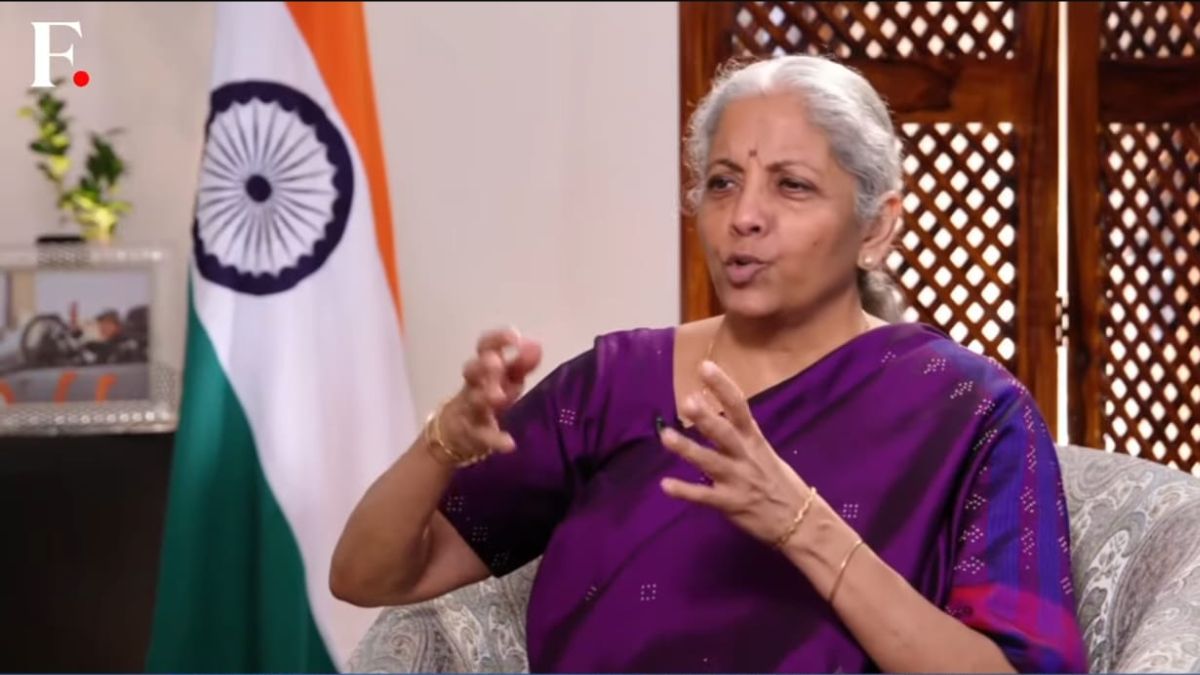Union Finance Minister Nirmala Sitharaman on Friday hit out at those justifying the ‘Brahmins profiteering’ remarks by Peter Navarro, the White House trade adviser.
In a recent interview, Navarro accused “ Brahmins ” of profiteering at the expense of ordinary Indians with the purchase and export of refinined Russian crude oil — a remark widely criticised as ignorant and offensive.
Sitharaman told Network 18 in an interview that “Brahmins profiteering” highlighted the imperialistic mindset and the “divide and rule” principle historically deployed by imperial powers. She said that she was “outraged” by attempts within India to justify such expressions.
‘Hurts me more when India echoes these words’
Sitharaman said, “It is one thing for a foreign government, head of state, or official to say all of that and the global diplomatic world is astonished at that kind of expression being used against India. But it hurts me more when those expressions are justified in India.”
Sitharaman added that India should not internalise or rationalise such colonial-era rhetoric:.
“Who actually wants us to know better and are explaining to us? I am outraged. I don’t want such explanations. India quoting those words and colonial justification is not right. Atmanirbhar also includes self-respect,” said Sitharaman.
Linking it to colonial tactics
Drawing a direct comparison to the British Raj, Sitharaman accused sections of the Opposition of acting like “friends of imperialists.”
She said, “They are following divide and rule strategy. Friends of imperialists (opposition leaders) are telling us the word ‘Boston Brahmins’ is not bad. We should be free from all this after 75 years of independence. This is exactly the same divide and rule policy the British used here and imperialists used here.”
Impact Shorts
More ShortsOn Russian oil purchases
Sitharaman reiterated India’s stance on continuing oil imports from Russia despite global pressure.
“Whether it’s Russian oil or anything else, if it is within our interest, we will have to take a call which decision suits us the best. So we will keep buying,” she said, underlining that national interest would remain the guiding principle.
Her remarks came a day after Commerce Minister Piyush Goyal , also in conversation with CNN-News18 Editor-in-Chief Rahul Joshi, sought to play down Navarro’s criticism.
While Sitharaman described the “Brahmins profiteering” remark as a colonial-style attempt at divide and rule, Goyal dismissed Navarro’s comments on India being the “maharaja of tariffs” as “misunderstandings or personal opinions”, stressing that they would not derail the India–US strategic partnership.
“We have seen the inaccurate and misleading statements made by Mr Navarro, and we categorically reject them,” the Ministry of External Affairs said in the meanwhile.
Navarro’s sharp criticism
Navarro has been one of the most vocal defenders of the Trump administration’s steep 50 per cent tariffs on Indian imports. He argued that “the road to peace runs in part through New Delhi”, suggesting the duties were meant to curb India’s discounted oil trade with Moscow. He also alleged that Indian refiners were acting as a “laundromat for the Kremlin.”
Goyal emphasises patience, diplomacy
Rejecting calls for retaliation, Goyal underlined that India would not escalate tensions.
“I believe in dialogue, diplomacy,” he told Joshi, describing India as a “patient nation” committed to strengthening, not weakening, its ties with Washington.
Trade ties under pressure
The US has imposed a 50 per cent tariff on Indian imports—split between a base 25 per cent duty and an additional 25 per cent surcharge linked to Russian oil purchases—hitting nearly $48 billion in exports. In response, India has announced GST cuts on hundreds of consumer goods to cushion domestic demand ahead of Diwali.
Puri counters Navarro’s ‘oil laundromat’ jibe
On September 2, Union Petroleum Minister Hardeep Singh Puri strongly pushed back against Navarro’s charge that India has become an “oil laundromat” for Russia.
Writing in The Hindu, Puri argued that New Delhi has acted fully within international rules while also helping to stabilise volatile energy markets. He noted that India has long been among the world’s top petroleum exporters, a position it held well before the Ukraine war and said refining margins and trade volumes have remained steady since Moscow’s invasion. Puri underlined that Europe itself relied on Indian refined fuels after banning Russian crude, making accusations of profiteering misplaced.
Navarro’s ongoing offensive
Navarro has repeatedly accused India of bankrolling Russian war by purchasing discounted Russian crude, refining it and then reselling the products at a premium.
In posts on X and in television interviews, he has even dubbed the Ukraine conflict “Modi’s war”, alleging that Indian refiners have turned New Delhi into a hub for Russian revenues. His remarks have drawn sharp reactions from India, who in no uncertain terms said the country’s energy trade is legal, transparent and essential for its security.
Russian oil imports in spotlight
India’s imports of Russian crude climbed dramatically after February 2022—from less than 1 per cent of intake to nearly 40 per cent, according to a CLSA report. Critics in Washington argue that Indian refined exports to Europe undermine sanctions, while India made it clear that Russian oil has never been under blanket bans like those on Venezuela or Iran.
Tariffs and the wider debate
Navarro framed Trump’s 50 per cent tariff on Indian imports as a twofold measure—25 per cent to counter what he called unfair trade barriers, and another 25 per cent tied to national security concerns about Russia. He claimed the US trade deficit with India effectively funds Moscow’s war chest, which the Trump administration official got it completely wrong.


)

)
)
)
)
)
)
)
)



